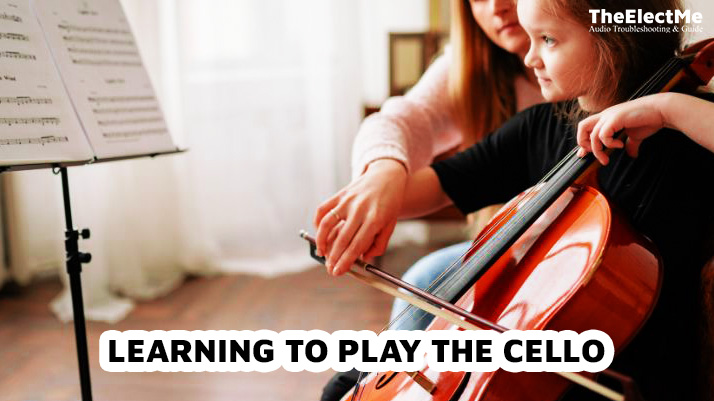Cello, a prominent member of the string family, holds an esteemed place in the world of music. Learning to play the cello can be an enriching experience, especially later in life.
Picking up a new skill, like learning to play the cello in your mature years, can bring immense joy and satisfaction. It’s about mental stimulation, emotional expression, and a sense of achievement. Age is just a number. It doesn’t define your capacity to learn or limit your potential.
So, let’s explore how you can begin this musical journey. Begin by addressing the potential challenges you may encounter at the start.

What Challenges Do Adults Face When Learning To Play The Cello?
Learning to play the cello can be more challenging for adults than for younger students. Here are some 3 common obstacles you may face:
Challenge 1: Physical limitations
Physical limitations refer to any physical conditions or disabilities that may affect one’s ability to play the cello. As we age, our bodies change, making learning a new instrument like the cello challenging.
For instance, hand coordination and agility issues can make handling the cello and its bow harder. Similarly, arthritis or joint stiffness can affect the fluidity and precision of finger movements required for playing.
Adults may also have difficulty sitting for long periods, which is essential while playing the cello. These physical limitations may require modifications in technique or adjustments in posture to accommodate.
Challenge 2: Time constraints
Another challenge adults may face when learning to play the cello is finding enough time to practice. With busy work schedules and family responsibilities, it can be tough to dedicate regular practice sessions.
Unlike younger students with more flexible schedules, adults must balance their learning with other obligations. This can lead to slower progress and frustration. However, it is possible to overcome this challenge with proper time management and commitment.

Challenge 3: Mental blocks
Self-doubt, fear of failure, or feeling too old to learn something new can hinder progress. Mental blocks hinder adults from fully embracing learning and succeeding in their cello journey.
Overcoming these blocks begins with a positive mindset and self-belief. Approaching learning with an open mind, free from preconceived notions, is essential. Mentorship and community support aid in overcoming mental barriers.
Related: How To Record Bass Guitar?
How To Start Learning To Play The Cello Despite The Challenges?
Now that you have identified potential challenges, let’s discuss how to learn despite them:
Find a Suitable Cello and Bow
When starting your cello journey, choosing the right instrument is crucial. Various cellos are suitable for beginners, each with unique characteristics and advantages.
- Student Cellos: These are beginner-friendly instruments, usually crafted from solid wood for excellent sound quality and durability.
- Electric Cellos: This modern variant of the traditional cello is a great choice if you’re interested in playing various music genres.
- Acoustic Cellos: A full-sized acoustic cello is a wise investment for serious learners and long-term players.
When choosing a cello, consider the instrument’s size, sound quality, playability, and craftsmanship. A bow is equally important since it significantly affects sound production. Choose one that feels comfortable to hold and produces a good sound.

Find a Qualified Teacher
The role of a teacher in learning to play the cello cannot be overstated.
A good cello teacher guides you in technique, posture, hand positioning, and music theory. They also provide valuable feedback, motivation, and support to keep you on track.
Qualities of a good cello teacher include patience, dedication, and a deep understanding of music and the cello. A good teacher should also be able to incorporate music literature that the student wishes to learn.
To find a good teacher, here are some tips:
- Ask for recommendations from music schools or musicians in your area.
- Attend local concerts and recitals to connect with cello teachers.
- Check online directories or platforms like TakeLessons or Lessonface.
- Take a trial lesson to assess the teacher’s style, approach, and suitability.
Set Realistic Goals
A realistic goal, including playing the cello, is essential when learning any new skill. It provides direction and motivation while keeping expectations in check.
A good teacher can help set achievable goals that align with your skill level and learning pace. With a clear roadmap, you can track your progress and celebrate milestones.
Here are some tips to keep in mind when setting goals:
- Set short-term and long-term goals.
- Make them specific, measurable, attainable, relevant, and timely (SMART).
- Be flexible and adjust goals as needed.

Remember that learning the cello is a journey with ups and downs. Don’t be too hard on yourself, and celebrate your progress.
Related: Can You Play A Bass Through A Guitar Amp? A Big Debate
Practice Regularly
As the saying goes, “Practice makes perfect.” Consistent practice is crucial for improving your skills and building muscle memory. It’s better to have short, focused practice sessions than sporadic long ones.
Here are some tips to make the most of your practice:
- Set a schedule and stick to it.
- Warm up before practicing.
- Break down difficult passages into smaller parts.
- Use a metronome to improve timing and rhythm.
- Record yourself playing to identify areas for improvement.
Remember, practice should be enjoyable. Remember to take breaks and have fun with your cello.
Let’s transition into becoming a part of a community of adult learners.
Why Is It Important To Be Part Of A Community When Learning To Play The Cello?
Joining a cello community or orchestra offers numerous benefits that enrich the learning experience. Connect with fellow cellists, share experiences, and learn in a supportive environment.
How to find a cello community?
- Check with local music schools, clubs, or orchestras for adult beginner classes.
- Attend workshops, masterclasses, or summer camps organized by cellists.
- Join online communities such as Cello Chat or The Cello Society.

What are the benefits of joining a cello community?
- Networking opportunities to connect with fellow cellists and professionals in the music industry.
- Access to workshops, masterclasses, and performances by experienced cellists.
- Support and encouragement from like-minded individuals on a similar journey.
- Opportunities to perform and improve playing skills in a group setting.
- Exposure to different styles of music and repertoire advice.
- Develop a sense of community and belonging within the cello world.
Being part of a community can also motivate during challenging times and help overcome mental blocks.
Conclusion – Learning to play the Cello
To sum up, learning to play the cello may have its challenges. However, anyone can learn to play this beautiful instrument with the right guidance and practice.
Remember that the learning journey is continuous and should be enjoyed. Pick up that cello and start your musical adventure today. So don’t give up if you encounter any barriers – instead, embrace them as opportunities for growth and improvement.


